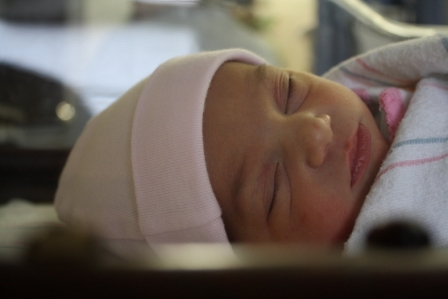Reading in Spanglish

3
Nov 2011
A Radical Blogger Profile
posted in: blogsUh, what’s a doula?
At the end of my pregnancy, I met a doula who specialized in supporting immigrant non-English speaking women. I didn’t really know what a doula was or how having a stranger at my delivery fit in to the big picture, so I didn’t follow up. I later read about Miriam Zoila Pérez, another doula, in Latina magazine. I figured it was time to look into this.
Pérez blogs at radicaldoula.com. She describes a doula as “the one person who’s not worried about anything else that’s going on,” someone who provides emotional and psychological support to a mother during childbirth.
After deciding that pre-med wasn’t for her, and seeing the natural birth documentary The Business of Being Born, Pérez decided to become a midwife, but was advised to become a doula because she wanted to work with lesbian and immigrant women. She spent a semester in Ecuador and volunteering in a maternity ward (not as an official doula). After returning to the States, Pérez trained to become a doula, working mostly with Latina immigrants.
Working with Immigrants
While working with immigrants, Pérez saw a discrepancy between the quality of care for Latina immigrants versus insured white women. One of the biggest issues was the language barrier. The hospital where Pérez worked only brought in an interpreter when papers are to be signed. The doctors “chose what they wanted to communicate and spoke English otherwise . . . imagine – what does that do to your quality of care?”A doula is not a translator, but Pérez was still challenged on how much to communicate to the mother.
According to Pérez, most Latinas give birth in a hospital instead of choosing natural birth at home or in a birthing center. She attributes this to the fact that in Latin America there is a “big push” by the World Health Organization and other developmental organizations for women to give birth in hospitals, because they see it as “a marker of development.” Immigrants also choose hospitals as a sign of class and social status – “in Latin America you go to the hospital if you can afford it,” Perez says.
When it comes to second and third generation Latinas, their positions on childbirth tend to come more in line with the general American population.
Full-Spectrum Doulas
Giving birth is not the only life-altering event in a woman’s reproductive health. Women also face abortions, miscarriages, and other events. This is where full-spectrum doulas such as Pérez come into play. A full-spectrum doula supports a woman not only during birth but for abortion, adoption, surrogacy and miscarriage.
Supporting women during abortions (some of these procedures are actually to help a woman who had a partial miscarriage) is quite controversial in the doula community. “I felt like I wasn’t connecting in the doula community] and wanted to talk about why being pro-choice made sense to me,” Perez says. She started the blog – a “new arena” at the time – to build the connections she sought.
Blogging/Feministing/Activisting
Perez has expanded from being a doula to blogging about it to writing, editing at feministing.com, and activism. She is a consultant for The National Latina Institute for Reproductive Health. She also has been nominated her for the 2011 Women’s Media Center Social Media Award! If you go to the Women’s Media Center website, you can scroll over to read about her nomination and then vote for her to win!
Punto
Having a baby is a beautiful and disgusting, exhausting and exhilarating, joyous and terrifying. Everyone gives you their crazy advice and horror stories. As a Latina, others might not understand your culture and family dynamics.
Even if you have a supportive husband and family visiting during labor, you wish they would get the hell out of the way during the trying moments of labor – but at the same time, you want someone to be there with you. This person could be a doula.
Latinas have diverse backgrounds and individual experiences with chilbirth, and our cultura should be taken into account to provide a supportive atmosphere during childbirth.
Other reproductive issues are often fraught with the same conflicting emotions. Thanks to doulas/bloggers/activists like Miriam Perez, we know that there is someone out there that can provide support to us during those tough times.

























Your article was exenelclt and erudite.